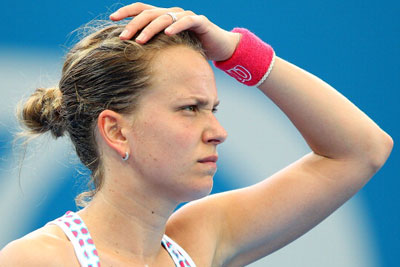London, Feb 14, 2013: The International Tennis Federation announced today that Barbora Zahlavova Strýcová has been found to have committed an Anti-Doping Rule Violation under Article 2.1 of the Tennis Anti-Doping Programme (presence of a Prohibited Substance in a player’s sample).
Ms Zahlavova Strýcová, a 26-year-old tennis player from Czech Republic, provided a sample on 16 October 2012 at the BGL BNP Paribas Luxembourg Open. That sample was sent to the WADA-accredited laboratory in Montreal, Canada for analysis, and was found to contain sibutramine, a stimulant. Sibutramine is a Prohibited Substance under section S6 of the 2012 WADA List of Prohibited Substances and Prohibited Methods, and is therefore also prohibited under the Tennis Anti-Doping Programme (the “Programme”). Ms Zahlavova Strýcová was therefore charged with an Anti-Doping Rule Violation under Article 2.1 of the Programme.
Ms Zahlavova Strýcová asserted that the sibutramine, for which she did not hold a valid therapeutic use exemption, had got into her system through her ingestion of the supplement ACAI Berry Thin. She denied any intent to enhance her performance as a result of taking the ACAI Berry Thin.
The ITF did not dispute Ms Zahlavova Strýcová’s account of the circumstances surrounding her ingestion of sibutramine, or that she (a) met the requirements to satisfy article 10.4 of the Programme (Elimination or Reduction of the Period of Ineligibility for Specified Substance under Specified Circumstances), and (b) bore No Significant Fault or Negligence.
Ms Zahlavova Strýcová’s commission of an Anti-Doping Rule Violation under Article 2.1 of the Programme was confirmed, and it was determined that she is suspended from participation for a period of six months, back-dated to commence from 16 October 2012 and so ending at midnight on 15 April 2013. It was also determined that Ms Zahlavova Strýcová’s results at the 2012 BGL BNP Paribas Luxembourg Open and the ITF Bueschl Open should be disqualified, with resulting forfeiture of the ranking points and prize money that she won at those events.
The Tennis Anti-Doping Programme is a comprehensive and internationally recognised drug-testing programme that applies to all players competing at tournaments sanctioned by the ITF, ATP, and WTA. Players are tested for substances prohibited by the World Anti-Doping Agency and, upon a finding that a Doping Offence has been committed; sanctions are imposed in accordance with the requirements of the World Anti-Doping Code. More background information on the Programme, sanctions, tennis statistics and related information can be found at www.itftennis.com/antidoping —- ITF


Leave a Reply
You must be logged in to post a comment.